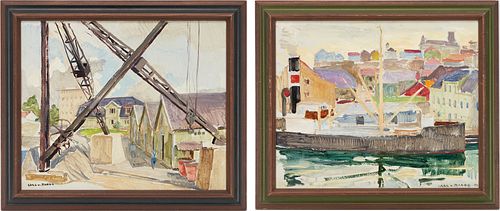2 Carl Von Hanno O/B Paintings, Harbor Scene & Construction Site
About Seller
4310 Papermill Dr. NW
Knoxville, TN 37909
United States
Case Auctions is based in Knoxville, Tennessee, where our gallery is located, with satellite offices in Nashville, Tennessee and Kingsport, TN – but our reach is worldwide. Established in 2005, we conduct cataloged auctions of investment-quality art and antiques under the stewardship of knowledgeabl...Read more
Two ways to bid:
- Leave a max absentee bid and the platform will bid on your behalf up to your maximum bid during the live auction.
- Bid live during the auction and your bids will be submitted real-time to the auctioneer.
Bid Increments
| Price | Bid Increment |
|---|---|
| $0 | $10 |
| $100 | $25 |
| $500 | $50 |
| $1,000 | $100 |
| $3,000 | $200 |
| $5,000 | $500 |
| $10,000 | $1,000 |
| $20,000 | $2,000 |
| $50,000 | $5,000 |
| $100,000 | $10,000 |
About Auction
Jul 9, 2022
Featuring 1200+ items from Southern estates and collections. Case Auctions bid@caseantiques.com
- Lot Description
Two (2) Carl Von Hanno (Norway/France, 1901-1953) oil on board paintings. 1st item: Maritime scene painting featuring multicolored architecture and a ship moored at harbor. Signed "Carl V. Hanno, 1950" lower right. 2nd item: Genre painting depicting two male laborers at a construction site, additional buildings visible in the background. Signed "Carl V. Hanno" lower left. Possible auction lot tag affixed en verso. Both housed in wooden frames, one with an ebonized trim and one with a green trim. Sights: 14 3/4" H x 17 3/4" W. Frames: 18 1/2" H x 21 1/2" W. Biography: "Von Hanno grew up in a bourgeois family and registered at the Norwegian School of Crafts and Art Industry School (SHKS) evening school at age thirteen and he graduated from the National Academy of Fine Arts under Christian Krohg and Halfdan Strom 1920-22. He lived in Paris in the fall of 1925 and became a student of Andre Lhote. In the second half of the 1920s, von Hanno worked in Western Norway, in Italy, and in North Africa. During this time, a painting of his was purchased by Queen Maud at an exhibition in the Artists' Association. After returning home, he participated in the competition for the decoration of Folkets Hus' party hall in Oslo and was awarded the 2nd prize for his draft Kranselaget. He continued to be influenced by French modernism and developed a characteristic form of cubism. In the fall of 1932 he was awarded the Draner Association's scholarship and stayed in Paris until the spring of 1933. Here he received a proof of Marcel Gromaire at Academie Scandinave. He attended exhibitions in renowned galleries and his work was purchased for the Musee de Jeu de Paume. Descriptions of workers and craftsmen became a main theme. Eventually, the content of his paintings became more politically motivated, and in 1933-34, von Hanno appeared as a social trendist in a moderate Cubist language. In 1935-37 he was an active member of the Socialist Cultural Front, a free-standing political association consisting of intellectuals and artists with a strong attachment to the labor movement." (source: Translated from the Norsk Biografisk Leksikon, the largest Norwegian biographical encyclopedia, originally published by Aschehoug, Oslo, between 1921-1983, 1999-2005).
The Estate of Carl Klein, Brentwood, Tennessee.Both in overall very good condition. Frames with minor abrasions.Condition
- Shipping Info
-
The UPS Store of Bearden 865-584-0081 (press 5), fax 865-584-0094 store2630@theupsstore.com Click to get a quote
The UPS Store of Northshore Knoxville Contact – Eve 865-951-2499 store6461@theupsstore.com
John & Max Express LLC NOTE: large items & white glove delivery services only (driving range limitations may apply) Contact – Dina 865-230-1568 johnmaxexpress@gmail.com
-
- Buyer's Premium



 EUR
EUR CAD
CAD AUD
AUD GBP
GBP MXN
MXN HKD
HKD CNY
CNY MYR
MYR SEK
SEK SGD
SGD CHF
CHF THB
THB
























